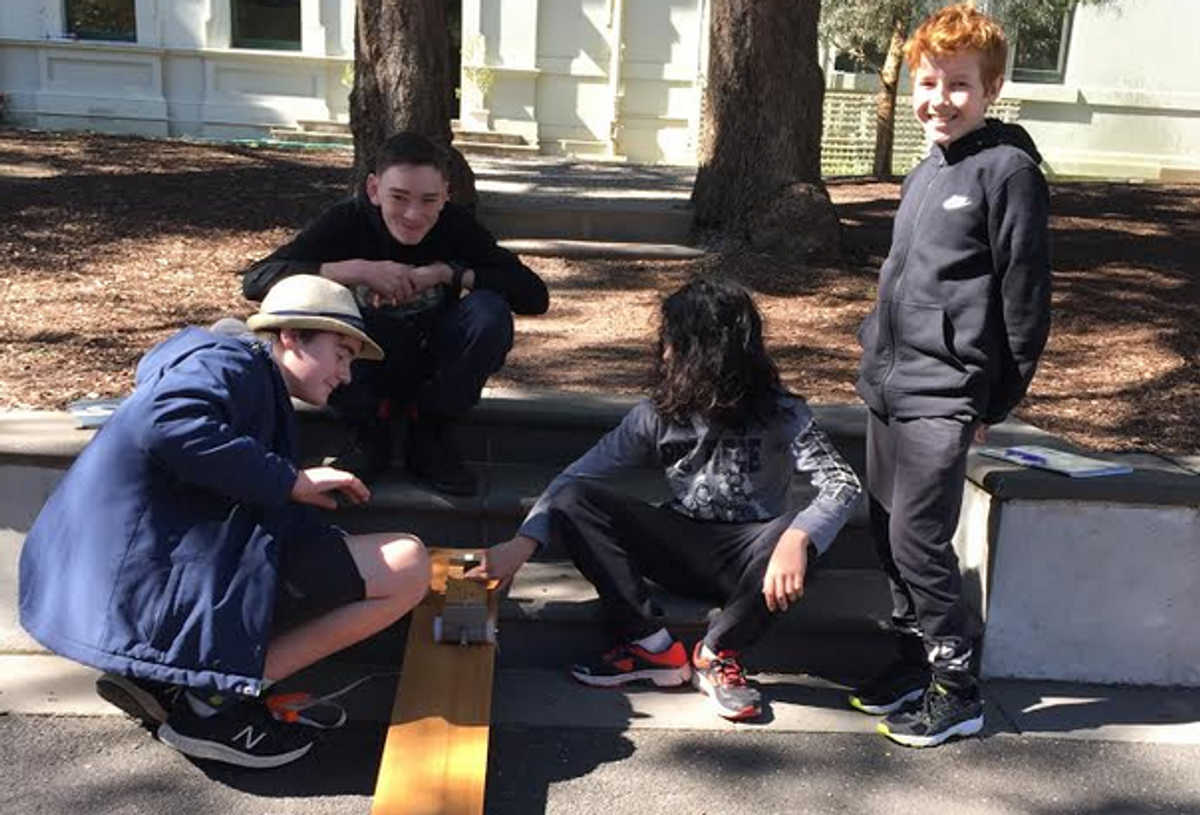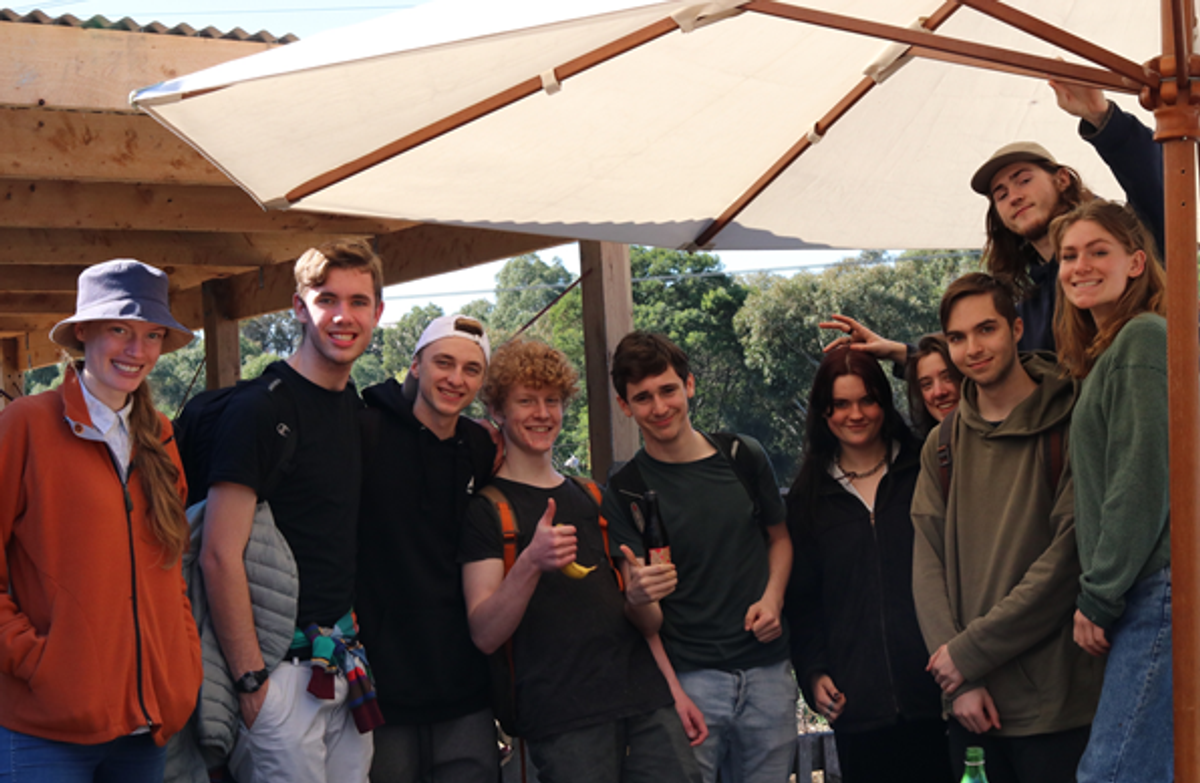Sciences
Merri Creek

Sciences
Merri Creek
by Sophie Maxwell, Science teacher


In Year 7 Science, students are investigating Forces and Motion. We learnt about Newton’s discoveries and demonstrated the three laws of motion in our own lives. Students also made compelling ‘Fakebook’ profiles for Newton. Students have since applied the laws of motion to interesting contexts, such as astrophysics, sport, travel and our own lives. We even calculated how high we could jump on different planets and celestial objects. For most of us, we could jump about eight metres on Pluto, where surface gravity is about 1/12th the surface gravity on Earth!
Students are now using their understanding of physics to design safety devices, which aim to protect an egg on its four-metre drop from upstairs Kalimna. Students are currently in the designing phase and have ideas ranging from parachutes to trampolines. Stay tuned to hear about their results!
by Mat, Year 11


On 24 August the DP ESS class headed off to Merri Creek and CERES for a fun day of learning and activity. The main focus of the day was to assess and act upon the impact of human activity on natural environments, including littering and eutrophication. We then went on a walk through CERES and Merri Creek and carried out evaluations of the environment and what it has become over time.
It was a very rewarding, informative and pleasurable day and allowed us to put into practice what we have been learning in class over the course of the term.
by Sophie Maxwell, Psychology teacher
On Friday 31 August the Year 12 Psychology class visited the Epworth Sleep Centre to observe how consciousness and brain waves are measured in a clinical context. It was a fascinating excursion and for most students it was a special occasion, being their last ever school excursion.
We had an interesting tour of the sleep laboratory where students witnessed all aspects of the daily functioning of a sleep lab. The most fascinating part of the excursion was when the sleep scientist, Liz, wired Hayden up to observe his brain waves as Hayden, quite remarkably, nodded off to sleep. Liz explained the data as we observed Hayden’s brain waves (EEG), eye movements (EOG), heart rate (ECG) and muscle tone (EMG) in real time.
Liz also told us many interesting stories about her patients who have sleep disorders like insomnia, periodic limb movement disorder and narcolepsy. Anika even demonstrated the CPAP machine, which is used for patients with sleep apnoea.
This was a valuable experience for students to consolidate and apply their knowledge of sleep and consciousness in an interesting hospital context.
by Victor Toufas, Biology teacher
On Wednesday 22 August, the Year 12 Biology class visited The Gene Technology Access Centre (GTAC) at Uni High in Parkville. Students participated in a laboratory program which has been designed to meet the practical requirements for Unit 4 Area of Study 2 Outcome 2 of the VCAA Biology Study Design 2017-2021.
The program exposed students to tools and techniques used for DNA manipulation in scientific research. Students gained the necessary laboratory and analytical skills by generating and applying recombinant DNA. The proteins of interest were the Green Fluorescent Protein (GFP) from a sea jelly and the Hepatitis B Surface Antigen (HBsAg) from the Hepatitis B virus. A restriction digest was performed to determine if the GFP and HBsAg genes were inserted into a plasmid and whether E.Coli bacterial cells were transformed with the recombinant plasmid for the production of GFP and HBsAg.
Back at school, further analysis of the students’ actual gel electrophoresis results and set of cultured agar plates of the transformed bacteria was conducted. They applied their knowledge and understanding by responding to a set of structured questions relating to the biological concepts and scientific skills they acquired.
A great learning experience overall!
by Victor Toufas, teacher of Science
EarthEcho Expeditions is a program of EarthEcho International, a non-profit organisation founded by Philippe and Alexandra Cousteau in honour of their father, Philippe Cousteau Sr, and grandfather, the legendary explorer Jacques-Yves Cousteau.
During the term break, I, together with 24 other selected fellows (classroom teachers) from around Australia, will join the EarthEcho team, along with scientists and engineers in Melbourne, on a week-long Expedition to examine ocean plastics and various innovative solutions that are being put in place for this global problem.
Throughout the Expedition we will be participating in on-site production, classroom content creation and post-Expedition distribution and evaluation of adventure-based STEM learning modules to classrooms across the world. The Expedition will offer the opportunity to collaborate with teachers alike to create a curriculum that introduces students to innovative engineering and technology solutions that are being implemented in Australia and around the world.
Back in the classroom, my aim will be to continue the work of the EarthEcho Expedition by inspiring curiosity in science and technology and supporting students to connect concepts from the classroom into their daily lives and the lives of others.
For further information regarding this expedition see the following link: http://earthecho.org/expeditions/plasticseas